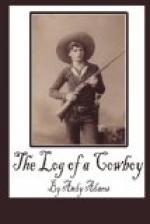The left flank of our skirmish line encountered the cattle as they reached the river, and prevented them from drifting up the stream. The point men abandoned the leaders when within a few hundred yards of the river. Then the rear guard of cripples and sore-footed cattle came up, and the two flanks of horsemen pushed them all across the river until they met, when we turned and galloped into camp, making the night hideous with our yelling. The longest dry drive of the trip had been successfully made, and we all felt jubilant. We stripped bridles and saddles from our tired horses, and unrolling our beds, were soon lost in well-earned sleep.
The stars may have twinkled overhead, and sundry voices of the night may have whispered to us as we lay down to sleep, but we were too tired for poetry or sentiment that night.
CHAPTER XXI
THE YELLOWSTONE
The tramping of our remuda as they came trotting up to the wagon the next morning, and Honeyman’s calling, “Horses, horses,” brought us to the realization that another day had dawned with its duty. McCann had stretched the ropes of our corral, for Flood was as dead to the world as any of us were, but the tramping of over a hundred and forty horses and mules, as they crowded inside the ropes, brought him into action as well as the rest of us. We had had a good five hours’ sleep, while our mounts had been transformed from gaunt animals to round-barreled saddle horses,—that fought and struggled amongst themselves or artfully dodged the lariat loops




